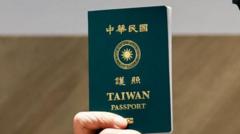The recent travel ban imposed by Somalia on Taiwanese passport-holders highlights ongoing geopolitical tensions and Taiwan's struggle for recognition on the international stage.
Taiwan Expresses Outrage Over Somalia’s Travel Ban for Taiwanese Passports

Taiwan Expresses Outrage Over Somalia’s Travel Ban for Taiwanese Passports
Taiwan's foreign ministry condemns Somalia's travel restrictions, calling for immediate revocation.
Taiwan has issued a strong condemnation regarding Somalia’s decision to prohibit travelers with Taiwanese passports from entering or transiting through the East African nation. This ban, which took effect on Wednesday, was prompted by an order from Somali aviation authorities last week. As of now, Somalia has not yet responded officially to the travel restrictions, which seem to be part of an increasing rapprochement between Taiwan and Somaliland, a region that declared independence from Somalia 34 years ago and enjoys limited international recognition.
Taiwan's foreign ministry reported that this travel ban stems from Somalia's civil aviation authority, which notified airlines that Taiwanese passports “will no longer be valid for entry into or transit through the Federal Republic of Somalia” effective April 30. Taiwan's government has strongly protested what it perceives as an unjust action spurred by China to impede the travel liberties and safety of Taiwanese citizens. The ministry has called for the Somali government to revoke the ban immediately.
Taiwan accused Somalia of misinterpreting UN Resolution 2758, linking it inaccurately to the "one China" policy. In light of the ban, Taiwan's foreign ministry has advised its citizens against traveling to Somalia or Somaliland until the situation is resolved. Taiwanese media have reported that neither Somaliland nor Somalia has issued further comments on the matter.
China welcomed the travel ban, describing it as a legitimate step that reflects Somalia's commitment to the "one China" principle. According to Chinese foreign ministry spokesperson Guo Jiakun, this action underscores Somalia's adherence to a geopolitical stance favoring mainland China's claims over Taiwan.
Taiwan—the self-governing democratic island—maintains its own governmental structure and conducts inclusive, multiparty elections. Conversely, China regards Taiwan as a part of its territory and has not ruled out the use of military force to unify the island with the mainland. Given increasing diplomatic pressure from China, Taiwan now enjoys recognition from only a handful of countries internationally.
Somaliland, recognized by no other sovereign state, proclaimed its independence from Somalia in 1991, a year marked by the collapse of Somalia's centralized government under General Mohamed Siad Barre. Somaliland has established its own democratic processes, in stark contrast to many areas in Somalia, where the Islamist militant group al-Shabaab operates and wields significant control.
Furthermore, Somalia has expressed dissatisfaction with Ethiopia for engaging in port leasing agreements with the Somaliland authorities, further complicating regional relations and sovereignty claims. As tensions heighten, the implications of the travel ban extend beyond individual freedoms, reflecting broader dynamics in Taiwanese and Somali international relations.



















